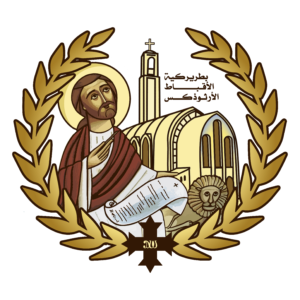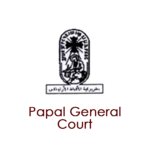The General Papal Office supervises the following:
Director of the Papal Office Secretariat:
– Scheduling meetings for the Director of the General Papal Office
– Taking calls and welcoming guests at the office of the Director
– Preparing for meetings periodic between the Director and other departments
– Preparing for meetings with the departments of Land Management, Property Management, and Legal Administration
– Recording of incoming and outgoing letters and correspondences of the Director
– Monitoring the decisions and concerns of the Director towards all departments, within and outside the Papal Office
– Notifying and coordinating between the departments to implement the instructions and directives of the Director
– Organizing means of transportation designated for the Papal Office’s departments’ responsibilities
– Making and preparing folders pertaining to the Director’s office
– Documenting all official matters of the Director digitally, and communicating through emails between the Director’s office and other departments
Financial Management:
– The Financial Management Department receives all cash, and reimburses all expenses related to the Patriarchate’s facilities after reviewing the submitted documents
– Monitoring liquidity and bank deposits, as well as monitoring cash in hand and depositing excess in the bank
– Writing checks to fund the treasury or checks to external parties
– Reviewing employees’ salaries and issuing them on ATM payroll cards through online banking tools that employ security tokens to ensure validity of the entered data and the transfer of all due funds
– Using banks’ online banking tools to view account statements at any time, as well as all transactions and balances
– The treasury official receives all cash and reimburses all expenses, as well as delivers funds to the bank, cashes checks from banks, and is responsible for any bank-related documenting
– The Financial Management Department utilizes a digital payroll system for all accounting purposes, including authorizations for receipts, payments, or invoices, as well as providing analytical statements and reports needed at any time
– An annual budget is prepared for Papal Office’s departments to provide the financial status
Human Resources:
First: Administration
– Registering attendance
– Registering, monitoring, and following up on regular and occasional time off and leaves without pay in accordance with the law and internal bylaws
– Registering, assessing, and reviewing financial penalties, deduction, salaries, and monthly bonuses
– Preparing periodic raises according to the exact percentage set by the Director of the Papal Office, and applying the change to the basic and changing salary using Form #2
– Classifying employees’ files, and examining and saving documents in a personal folder for each, after filling out all forms
– Writing official letters for the Office’s employees at the request of government agencies or other concerned parties
– Constructing lists of employee’s records with their marital status, qualifications, and date of hire, sorted by seniority and salary
– Completing the hiring process based on an appointment decision for new hires, after completing the legal procedures and documents
– Compiling annual reports of supervisors and departments’ heads
– Calculating overtime based on attendance records
– Providing certifications to some employees
Second: Social Insurance
– Drafting out forms #1 and #6 for new hires, pensions, resignations, and death
– Drafting out insurance form #2, submitting it to the National Organization for Social Insurance digital records, and linking it to the Patriarchate’s account at the organization to update records, through a settlement memorandum, by merging with payroll records
– Observing and auditing the Patriarchate’s account at the national organization with the internal account to confirm records are up to date
– Observing and reviewing the Patriarchate employees’ information that are recorded digitally
– Offering all insurance-related services at the national organization on behalf of all Papal Office employees
Third: Health Insurance
– Filling medical examination forms and setting appointments for new employees
– Making health insurance cards
– Constructing annual lists of employees benefiting from the health insurance, and their information
– Issuing referrals for patients from the Patriarchate to the Health Insurance Authority for examination, treatment, and requests for leaves
Fourth: National ID Number
– Providing national ID numbers for bishops and priests, and making any changes in information as well as renewing the ID card every seven years
– Providing national ID numbers for employees who are insured, and making any changes in information as well as renewing the ID card every seven years
Land Management:
– Monitoring and collecting rent from farming lands owned by the Papal Office and that are under the care of His Holiness, the Coptic Orthodox Patriarch
– Calculating the annual rental value for each tenant; all together is 2611 tenants nationwide
– Collecting rent from the tenants
– Accompanying lawyers for inspections by experts from the Ministry of Justice, and engineers from the General Survey Authority for surveying lands in person
– Monitoring agricultural associations in the entire nation for production requirements
– Monitoring any trespassing on farming lands, and filing reports against those at agricultural associations, and informing the Legal Department of the trespassing, and the Survey Authority to inspect it
– Reporting any irrigation and drainage issues that the Patriarchate’ lands are exposed to
– Calculating agents’ commission and reviewing the affiliated-tenants’ accounts
– Monitoring the transfer of tenantship from the current tenants to others, and the process of legalizing their status
– Administrative work within the management
– Submitting collection recordings to accounting on a regular basis
Property Management:
– Monitoring all properties owned by the Papal Office by collecting rent from tenants
– Rewriting leases based on the beneficiaries’ requests, then submitting them to the Property and Land Committee to assess the rental value in accordance with the current market price by an expert appraiser, considering priority leasing based the terms and conditions of each case separately
– Monitoring that the leased property is being used for the purpose it is leased out for and that there are not any violations to the contracts between the Patriarchate and the tenants; in the event that any violations arise, the management informs the legal department to take the necessary steps towards the violators
– There are some properties that were abandoned years ago and extorted by others due to the lack of a deed or lease to confirm our ownership; negotiation with the occupier (i.e. illegal tenant) were made to reach an agreement to legalize their position and establish a lease, confirming our ownership of the property, or negotiate with him to sell the property and then replace it with another
Surveying and Mapping:
– Performing cadastral surveys for all tenants, as well as drawing sketches for properties
– Filling details in cadastral maps based actual markers
– Writing up cadastral maps for each lot/block with details of tenants
– Performing periodic checks on property lines and tenants for writing up leases
– Performing different types of leveling using the appropriate tools
– Presenting before experts from the Ministry of Justice during proceedings to testify concerning technical aspects, as well as assisting lawyers
– Conducting appraisals of the Patriarchate’s properties and lands, and providing sketches based on the results
– Surveying property boundaries between the Patriarchate’s land and the neighbor’s
– Surveying the Patriarchate’s lands that are extorted
– Surveying and writing up cadastral maps for the Patriarchate’s cemeteries
– Searching for and archiving deeds and proof of ownership
Engineering & Maintenance:
– Basic construction jobs, including masonry, cement coating, painting, carpentry, plumbing, electricity, and all necessary finishes
– Maintenance work in all areas for buildings of the Papal Office within and outside the cathedral complex
– Carrying out all types of inspections for the Patriarchate’s properties in all governorates, and providing professional opinions to assist other departments
Legal Administration:
– Monitoring lawsuits brought by or against the person of the Pope, or the Coptic Orthodox Patriarchate and some churches, as well as lawsuits related to any ownership disputes of the Patriarchate’s properties and lands, and legal status cases in which the Church is the defendant; moreover, providing representation in expert offices of the Ministry of Justice, and reporting to police departments and prosecutors and conducting internal investigations with all the Patriarchate’s employees in the event of any employment or labor violations
– Providing certificates for inheritance claims prior to 1955 AD
Cemetery Management:
The General Papal Office manages some of the Coptic Orthodox cemeteries in Cairo:
* Saint John the Baptist Monastery Cemetery – Red Mountain, Abbasiyya
* Saint George Monastery Cemetery – Ahmed Esmat St., Ain Shams
* Abba Shenouda Monastery Cemetery – Nasr City
* El-Katameya Cemetery
* Ard El-Golf Cemetery
The Management Tasks:
– Inspecting each monastery regularly to learn general state of the cemetery and the specific state of each grave
– Reconciling the beneficiaries’ official status for each grave by preserving documents that indicate their right to use the grave and to pass it on as an inheritance
– Collecting the annual fees set for each grave in accordance with the regulations established by the General Religious Council and the Cemetery Management Committee
– Providing analytical financial statements for the revenues and expenditures of each monastery on a regular basis (monthly and yearly), as well as the final statements for graves
– Regulating dealings with the beneficiaries and their inheritors with regard to graves to provide cards for each to those who are authorized
– Issuing construction and restoration permits for graves based on a previous request submitted by the beneficiaries or the inheritors
Deeds Department:
– The Patriarchate possesses approximately 7,000 deeds for many properties in various neighborhoods of Cairo; all these are preserved in the Deeds Department
– Preserving all deeds from natural wear and tear
– Sterilizing deeds with certain chemicals to keep them safe from bacteria
– Scanning deeds and transferring them through DVDs or disks to reference them in case of any ownership disputes or for safekeeping
Legal Status and Family Department:
First: General Tasks
– Ratifying certificates of no impediment to marriage for Cairo, dioceses, and Copts abroad
– Translating certificates of no impediment to marriage to English
– Translating certificates of baptism to English
– Providing priests with baptism ledgers
– Receiving those who wish to become members of the Coptic Orthodox Church by presenting certificates of the absence of any impediments and providing the proper information and signing the membership record that is then registered and sent to the priest to take the ecclesiastical procedures for joining; only after the priest responds with the completion of the ecclesiastical procedures, does the person become a member of the Coptic Orthodox Church
– Attending meetings for breaking engagements with the general vicar of the Patriarchate upon the request of one of the couple, and writing letters to request the presence of the engaged couple to issue a final decision, either to break the engagement or reconcile
– Taking count daily, and delivering fees to the Papal Office, as well as documenting such fees in the appropriate ledgers
– Filling the General Clerical Council files in addition to all issued decisions
– Drafting marriage permits issued by the General Clerical Council and mailing them to priests after being certified by the council
– Documenting all correspondences issued by the General Clerical Council in the proper mail register
Second: Providing Documents and Certificates
– Providing ordination certificates for newly-ordained priests
– Notarizing the renew form for the national ID cards of the fathers the bishops, priests, and monks, the nuns, the consecrated women, and the chanters, as well as drafting certificates for this change in the civil registry
– Providing authentication certificates for priests to establish marriage contracts in courts
– Providing representation on behalf of churches abroad in the case of shipping ecclesiastical books, pictures, and furniture/equipment from churches in Egypt
– Certifying all marriage-related certificates that are signed by a priest and hold the Church’s seal, as well any documentation needed for requesting corrections to the religion field on the national ID card
– Corresponding with the Ministry of Foreign Affairs regarding renewal of the stay period of non-Egyptians in Egypt that are affiliated with the Coptic Orthodox Church
– Certifying the diplomas of the religious institutes that are affiliated with the Patriarchate to be authenticated by the Cairo Security Directorate
– Certifying representation on behalf of churches and dioceses in regard to purchasing and registering vehicles, and requesting building permits for churches, in addition to mediating between the bishops and the Housing Directorate
– Corresponding, with the approval of His Holiness, the Pope, to grant bonuses to priests, chanters, and church workers
– Corresponding with the churches in Cairo to notify them with specific Holy Synod decisions, rites matters…etc.
– Recommending priests and church servants to speak in meetings and conventions held by the Holy Synod committees
– Responding to correspondences received from the Public Prosecution office and the judicial branch concerning any legal status matters
Third: Files of the Office of the General Vicar of the Patriarchate
– His Holiness’ approval for priests to travel abroad and to take time off
– Preparing files for priests’ ordinations and elevations to the rank of hegumen
– Approving card applications for priests in Cairo
Marriage Certificates Department:
– Receiving engagement records and marriage contracts from priests after reviewing them and providing a receipt record
– Registering all engagement records in the index and registry, as well as making a folder for each record
– Issuing marriage permits and church reservations
– Providing copies of engagement records and marriage contracts from the archive using the index number of each record
– Approving records of withdrawal from the engagement
– Transferring engagement records to dioceses outside Cairo
– Saving engagement records files in folders and sorted alphabetically based on name in a designated area until marriage permits are drafted
– After drafting marriage permits, the folder is archived and confidentially protected
– After receiving the marriage contract from the priest, it is attached to the existing folder that is archived accordingly
– When any person submits a request for a copy of his/her marriage contract, it is searched for in the archive using the index number, and is given an official copy approved by the General Vicar of the Patriarchate
– Collecting fees for each request accordingly as well as providing receipts
– Providing daily reports for the departments of the Papal Residence
– Translating engagement records and marriage contracts to English
– Collecting translation fees and providing a receipt
– Reviewing priests’ ledgers for engagements and marriages after completion, and issuing new ones in places of those that expired
– Translating engagement records and marriage contracts received from abroad from English to Arabic, and approving them
– Scheduling meetings for breaking engagements upon the request of one of the couple
– Drafting and approving replacement records of withdrawal from the engagement
– Turning over all cash received at the marriage contracts office to His Holiness, the Pope
IT Department:
– Most departments have been connected to a network
– Regular maintenance and troubleshooting of all computers, printers, scanners, and other types of hardware
– Installing necessary applications for every department, which facilitates tasks and speed up reporting
– Providing network security
– Providing network accounts for new employees
This page is also available in:
العربية



